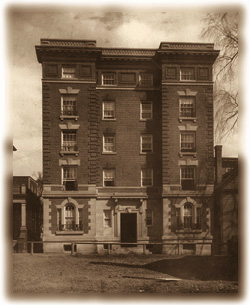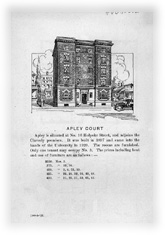Main Menu · Search · Current Issue · Contact · Archives · Centennial · Letters to the Editor · FAQs
![]()
Main Menu ·
Search · Current Issue · Contact · Archives · Centennial · Letters to the Editor · FAQs
 Apley Court on Holyoke Street will be remodeled this summer for the extra members of the class of 2001. Dean of the College Harry Lewis says the renovations will provide "amenities similar to those of dormitories in the Yard, including a common room, laundry facilities, and accommodations for freshman proctors." The Dudley House tutors and upperclassmen who have been housed in the building will move to Claverly Hall.HARVARD UNIVERSITY ARCHIVES. PHOTOGRAPH CIRCA 1900, ADVERTISEMENT (lower left) CIRCA 1921
Apley Court on Holyoke Street will be remodeled this summer for the extra members of the class of 2001. Dean of the College Harry Lewis says the renovations will provide "amenities similar to those of dormitories in the Yard, including a common room, laundry facilities, and accommodations for freshman proctors." The Dudley House tutors and upperclassmen who have been housed in the building will move to Claverly Hall.HARVARD UNIVERSITY ARCHIVES. PHOTOGRAPH CIRCA 1900, ADVERTISEMENT (lower left) CIRCA 1921 |
This April brought more triumphant cries than usual from envelope-tearing high-school seniors: the class of 2001 will include 30 more students than its predecessor, in response to what dean of the College Harry Lewis calls "the extraordinary strength of the pools of applicants in recent freshman classes." Director of admissions Marlyn McGrath Lewis, underlining her husband's point, says the permanent shift from 1,620 to 1,650 freshmen allows Harvard "to make more of the excellent investments we are able to make each time we admit a class."
To accommodate the increase without changing the size of the College overall, transfer admissions will be reduced. Associate director of admissions Rosemary Green, who sits on both the transfer and freshman admissions committees, says that, even though "there are very well qualified candidates in both pools," the College would prefer to offer more students a four-year stay, including the freshman experience.
Looking back on her own college career, transfer Mary Fackler Schiavo '76 says she regrets missing freshman year, because "that's when friendships are formed and cemented for life." But the former Inspector General of the U.S. Department of Transportation adds that intellectually she benefited greatly from spending two years at Ohio State, where she could take flight training and aviation courses, before transferring to Harvard, where she concentrated in psychology.

If fewer transfers are being accepted, Schiavo says she hopes "everyone who should be at Harvard is applying out of high school." But other transfers think their very dislocation is a boon. Eric Bennett '97, who arrived at Harvard after completing the two-year program offered by Deep Springs College, feels the change enhanced his education. "There's a complacency about being somewhere for four years," he says. "The best way to learn is a radical transplant." And because he would be in Cambridge for only two years, Bennett immediately threw himself into the extracurriculars that interested him. "Since I was under more time pressure," he explains, "I did everything I wanted to do right away."
Bennett also thinks transfer students offer rich variety to the College: "There's enough uniformity inherent in any institution," he argues, "to put a premium on fresh voices." For her part, Rosemary Green says the College greatly values the diversity of experience transfer students bring. The new policy is "not a monumental shift," she says, because transfer rosters have always been adjusted based on housing availability. And, she adds, other quality of life issues--including class size, eating arrangements, and advising--must dictate some admissions decisions, lest a too-large class overtax the College's resources.
Last fall the College matriculated 100 transfers; a 30 percent cut, though significant, hardly eliminates the program. The dean of the College says, "The exact number of transfer students has not been set in the past as a result of any special educational decision, so it is not a major departure for it to be changed in this way."
Main Menu ·
Search · Current Issue · Contact · Archives · Centennial · Letters to the Editor · FAQs
![]()